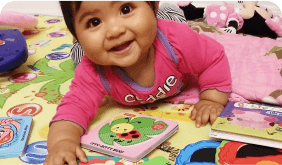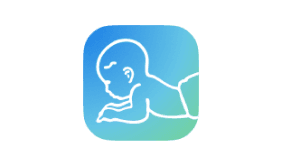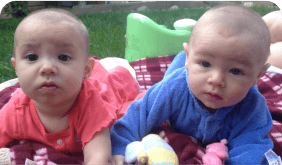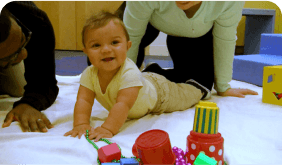As soon as Baby comes into the world, they will begin routine well-baby (or well-child) visits with their healthcare provider. These visits will change with Baby’s health needs as they get older. Here’s what you should know for well-baby visits at each age
What is a well-baby visit?
Well-baby visits are check-ups that ensure Baby is healthy and developing on track. During these visits, Baby’s healthcare provider will ask medical-related questions, do a physical exam, and discuss Baby’s developmental milestones and abilities. If there are any concerns about Baby’s development, Baby’s healthcare provider will discuss them with you and help make the appropriate referrals.
How often are well-baby visits?
The American Academy of Pediatrics (AAP) recommends Baby’s first doctor visit be at 3 to 5 days old. After that, Baby should have well-baby visits at months 1, 2, 4, 6, 9, 12, 15, 18, 24, and 30. Once Baby turns 3, the AAP recommends one check-in a year until age 21. If Baby was born prematurely, they will follow the same well-baby schedule unless their healthcare provider recommends additional check-ups.

How to Prepare for a Well-Child Visit
These appointments are a great time to discuss any questions or concerns you might have about Baby’s care; a little prep will help you direct the conversation with ease! Here are a few ways you can prepare for Baby’s well-child visits:
Write down any questions you have for Baby’s healthcare provider
Fill out these Ability and Milestone Checklists
Track Baby’s progress in the Pathways.org Baby Milestones App
Well-Child Visits by Age
Here’s what to expect at each appointment as Baby ages:
3-5 Days Old Visit
Baby’s healthcare provider will assess:
Baby’s measurements, including weight, length, and head circumference
Physical health
You may talk about:
Results from Baby’s hearing and blood screenings (received in the hospital)
How Baby is being fed—by breast milk or formula—and how much they need to eat
Starting Tummy Time
Diapering details and what to expect, like the color of Baby’s poo and consistency
1 and 2 Months Visits
Baby’s healthcare provider will assess:
Measurements
Physical health
Breast milk or formula intake
Progress on 0-2 month milestones and abilities
You may talk about:
Baby starting to lift and hold up their head during Tummy Time
Baby’s daily bowel movements and wet diapers
How you are feeling as Baby’s caregiver
4 and 6 Months Visits
Baby’s healthcare provider will assess:
Measurements
Physical health
Breast milk or formula intake
Iron intake
Progress on 2-4 month, 4-6 month milestones and abilities
You may talk about:
Baby rolling over during Tummy Time
Baby’s daily bowel movements and wet diapers
Signs Baby is ready to start solid foods
9 Months Visit
Baby’s healthcare provider will assess:
Measurements
Physical health
Breast milk or formula intake
Progress on 6-9 month milestones and abilities
Screenings: developmental and behavioral
You may talk about:
Baby’s hearing and vision
Baby’s feeding behaviors
Changes in pooping as Baby tries new foods
12 Months Visit
Baby’s healthcare provider will assess:
Measurements
Physical health
Iron level
Progress on 9-12 month milestones and abilities
Screenings: hearing, vision, blood lead level, and blood pressure based on risk
You may talk about:
Baby’s first steps
Baby’s feeding behaviors
Changes in napping and sleep
Changes in pooping as Baby tries new foods
15 and 18 Months (1 1/2 Years Old) Visits
Baby’s healthcare provider will assess:
Measurements
Physical health
Iron level
Progress on 12-15, 15-18 month milestones and abilities
Screenings: developmental, behavioral, and autism spectrum disorder (18 months); hearing, vision, blood lead level, and blood pressure based on risk
You may talk about:
Baby’s growing vocabulary
Baby walking independently
Changes in pooping as Baby tries new foods
24 Months (2 Years Old) Visit
Baby’s healthcare provider will assess:
Measurements
Physical health
Progress on 18-24 month milestones and abilities
Screenings: autism spectrum disorder, tuberculosis, anemia, hearing, and vision
You may talk about:
What foods Baby is eating
Changes in napping and sleep
Signs Baby is ready to start potty training
30 Months (2 1/2 Years Old) and 3 Years Old Visits
Baby’s healthcare provider will assess:
Measurements
Physical health
Risk for hearing and vision problems
Progress on 24-30, 30-36 month milestones and abilities
Screenings: developmental and behavioral (30 months); vision and oral (3 years)
You may talk about:
How you and Baby communicate
How Baby plays with others
Potty training
4, 5 and 6 Years Old Visits
Baby’s healthcare provider will assess:
Measurements
Physical health
Blood pressure
Progress on 3-6 year old abilities
Screenings: hearing, vision, oral, fine, and gross motor skills
You may talk about:
Starting school
Reading and speech ability
Changes in napping and sleep
Bathroom habits
7+ Years Old Visits
Baby’s healthcare provider will assess:
Measurements
Physical health
Blood pressure
Screenings: vision and hearing
You may talk about:
Your child’s emotional health
Physical activity and diet
Body changes





